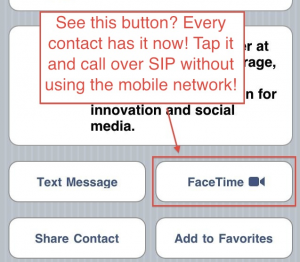 Apple has taken a beating from the “in crowd” lately. In the mind of these technophiles, they’ve gone from hip to evil in just a few years. While Apple is lambasted for turning the iPhone “walled garden” into a jail, Google is applauded as the new bastion of openness and geek friendliness. This criticism focuses on the iPhone, especially with regard to the despised American mobile carrier, AT&T. But Apple is a long way from the evil empire it’s accused of being, and is showing signs that it will soon retake its mojo from the carriers.
Apple has taken a beating from the “in crowd” lately. In the mind of these technophiles, they’ve gone from hip to evil in just a few years. While Apple is lambasted for turning the iPhone “walled garden” into a jail, Google is applauded as the new bastion of openness and geek friendliness. This criticism focuses on the iPhone, especially with regard to the despised American mobile carrier, AT&T. But Apple is a long way from the evil empire it’s accused of being, and is showing signs that it will soon retake its mojo from the carriers.
How Did It Come To this?
Apple spent most of the past decade as the darling of techies and iconoclasts, a tricky position to be sure. OS X, with its UNIX underpinnings and NeXT foundation, was loved by hardcore nerds, many of whom abandoned Windows once Macs moved to the faster (and somewhat cheaper) Intel CPUs. And Apple always had a strong foothold among anti-establishment (read Microsoft) types – teachers, artists, and the like. These combined demographics supported the company for a while, but it was the public failure of Windows Vista, a friendly PR campaign, and a successful retail strategy that led to the resurgence of Apple in the market as a whole.
It’s easy to forget now, four years “After iPhone”, just how awful the mobile phone world was before Apple’s phone arrived. This is especially true of the United States, where iron-fisted carriers seemed to spend all their time coming up with new ways to exploit their locked-in customers. But, apart from a few bright spots like the high-end Nokia models, the handset market worldwide was downright depressing. Handset makers were happy to disable or remove features, withhold updates, and tailor hardware to appease carriers in exchange for access and subsidy money.
Then the iPhone came, and everything changed. Although many previous mobile handsets had been desirable, none had the public success of this Apple product. It has become the singular “must-have” phone in nearly every market, and competitive conditions have allowed Apple to dictate terms to the carriers everywhere but the United States. Software updates have allowed Apple to sidestep the carriers in previously-captive areas like ringtones, music, apps, and video conferencing support. All of these cash cows are now in Apple’s hands.
USA Versus Them

But the American situation is different. AT&T’s exclusive deal allows them to push back on Apple’s moves, and this has resulted in suppression of certain features disagreeable to the carrier. Although some areas (ringtones, apps, music, GPS, and Bluetooth support) have opened up across the market, AT&T was adamant in its opposition to MMS, tethering, 3G video, and other network-sapping features. The carrier now allows tethering, but customers on unlimited plans cannot use it.
The unavailability of these features has led to frustration among American iPhone customers. Since American tech bloggers remain in the majority, this has led to a backlash against Apple among the cognoscenti that puzzles much of the rest of the world. Most international carriers have long since enabled all of the iPhone’s features, from MMS to tethering, and will likely support FaceTime video chat over 3G once Apple can tune the codecs to make it work reliably.
The difference in iPhone experience is competition. AT&T is able to restrict these features because consumers can’t (easily) jump ship to another carrier and keep their iPhone. Given the choice between restricting the iPhone in a given country and not selling it there at all, Apple makes the same decisions Motorola, RIM, Nokia, and others made in the past. This is why the China Unicom iPhone lacks Wi-Fi hardware and why tethering and other features are restricted in the United States.
Competition might not immediately open up all iPhone features. After all, AT&T and Verizon still widely restrict tethering on Android phones even though Sprint allows it. But competitive pressure will inevitably force change. If Sprint’s Android bet pays off in the form of subscriber market share their larger competitors will certainly change their stance on restriction of features. The same will likely happen once the iPhone becomes available on other American carriers.
Stephen’s Stance: Apple Is Stealing Back Their Mojo
Apple can’t be happy being labeled the bad guy for AT&T’s restrictions. But they seem perfectly content imposing rules of their own on their customers. In fact, I suspect that Apple had more to do with rejecting the Google Voice app than AT&T, but the reason is more complicated than protecting their carrier or keeping a competitor from replacing a key part of their product.
In my opinion, Apple has a long-term plan to “liberate” consumers from the wireless carriers altogether, welcoming them to the Apple-sphere with open arms. They will grudgingly put up with limits and abide by exclusivity agreements to get critical mass in the market place, but are engineering a coup in the background. If things go their way, Apple will soon reduce carriers to mere network connectivity providers, shifting all services (voice, text, data, software sales, etc) into their own pockets.
 Although it might not look like much today, FaceTime is key to this strategy. FaceTime makes voice-over-IP usable in a way that no other application has, even excellent ones like Skype, Google Voice, and Magic Jack. Apple is building a transparent and user-friendly experience leveraging standard protocols like SIP and placing themselves at the middle of this new network. iPhone 4 customers can already place calls without touching AT&T by tapping the “FaceTime” button in Contacts. It’s simplicity itself, and it won’t be long before audio-only multi-platform calling is enabled. Soon, AT&T and other carriers will be a lot less powerful.
Although it might not look like much today, FaceTime is key to this strategy. FaceTime makes voice-over-IP usable in a way that no other application has, even excellent ones like Skype, Google Voice, and Magic Jack. Apple is building a transparent and user-friendly experience leveraging standard protocols like SIP and placing themselves at the middle of this new network. iPhone 4 customers can already place calls without touching AT&T by tapping the “FaceTime” button in Contacts. It’s simplicity itself, and it won’t be long before audio-only multi-platform calling is enabled. Soon, AT&T and other carriers will be a lot less powerful.
As Stuart Henshall says, “FaceTime facilitates a way for Apple to take over the mobile numbers from the carriers and then uses them to build their VoIP network and replace the traditional numbers.” I couldn’t have said it better, and wish I had read his article before writing mine!
Will Apple be greeted as liberators or tyrants? This is the real challenge for the company. Their growing market position is largely based on the widespread belief among consumers (if not techies) that Apple is on their side. The sky is the limit if the company can make their end-run around the carriers and maintain this friendly public face.
Image credit: “Ball ‘N Chain” by WyldWoods (WW.N)
iPhone features the most revolutionary user interface since the mouse. It’s an entirely new interface based on a large multi-touch display and innovative new software that lets you control everything using only your fingers.